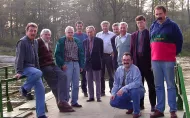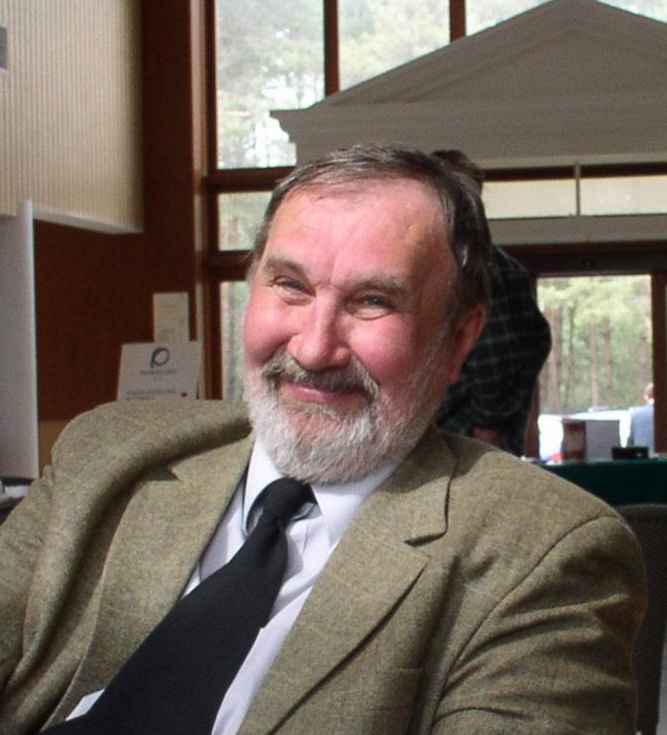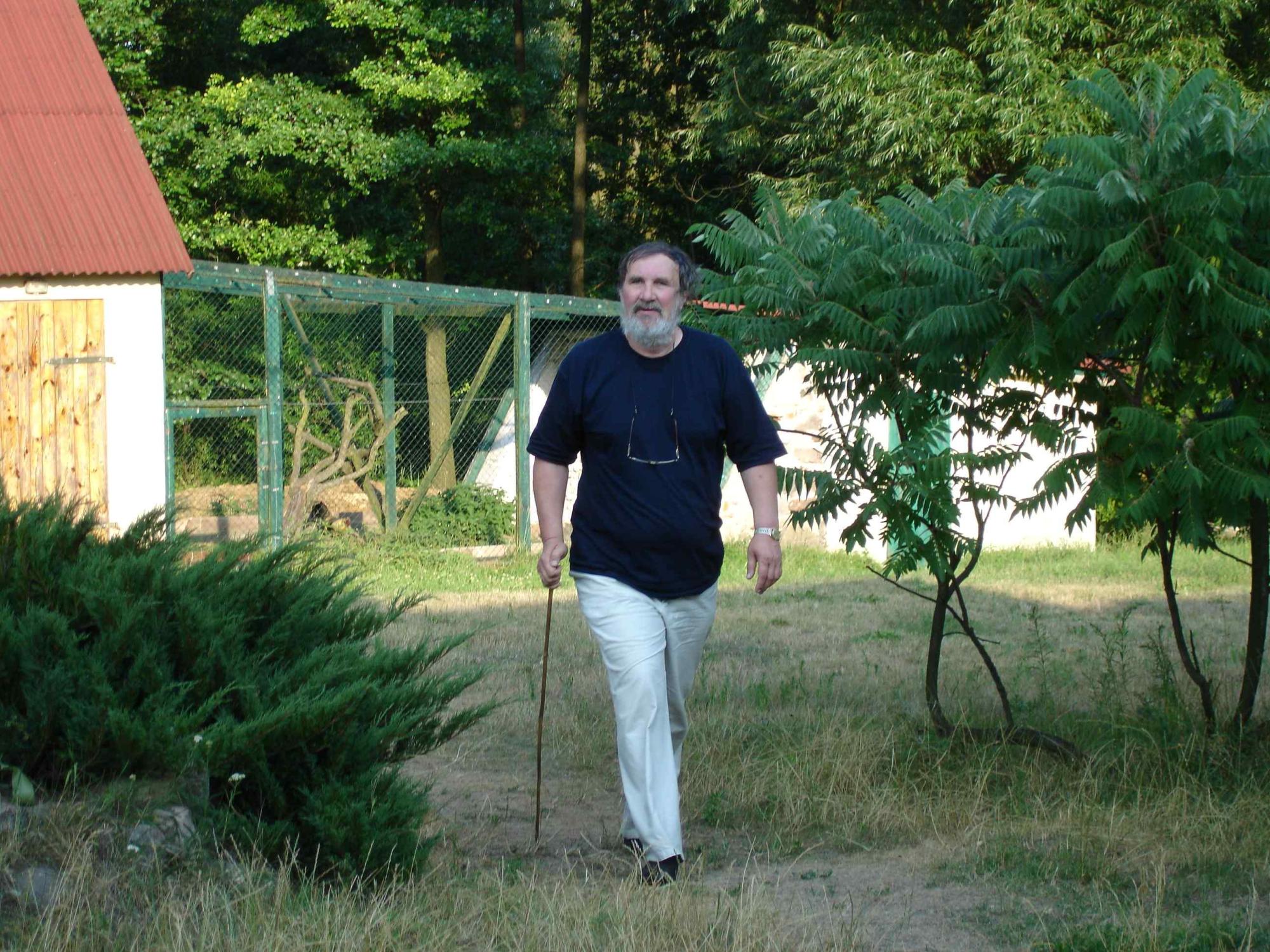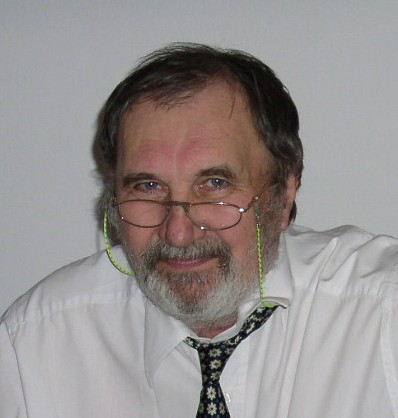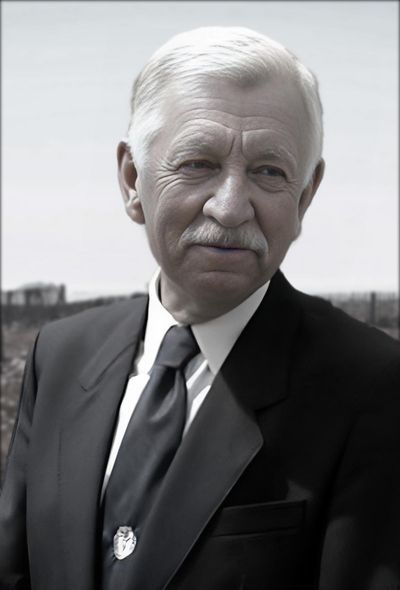Jarkowi Strzałko - In Memoriam
Jarek Strzałko was born on September 21, 1945 in Łódź, died on January 21, 2017 in Marianów Sierakowski. He has been associated with the Department of Machine Dynamics for the last ten years (2007–2017). He had over 50 years of experience at the Lodz University of Technology and the Faculty of Mechanical Engineering, including the studies he started in 1963. Fascinated by mechanics, he worked scientifically even during a serious illness: he supplemented the book with new examples of tasks and had fun solving them - the effects are visible in the script Basics of Analytical Mechanics, he was interested in the classes and progress of younger colleagues from the Department - he browsed their latest publications on the Internet.
Before joining the group of employees of the Department of Machine Dynamics, he was at the Department of General Mechanics, where he started working as an assistant (1969) and continued after obtaining his doctorate (1975) as an assistant professor, until his habilitation (2000). It was a time when he intensively deepened his knowledge, collected and studied monographs on mechanics (he left a rich collection of literature published in the second half of the 20th century). He spent many hours at work, sometimes, to relax, he played chess games with his colleagues or a ping-pong match (once in the A22 building there was a game table in the basement). Partners knew he didn't like to lose.
He acquired skills in solving mechanical problems while working on a set of problems published before World War II by Z. Straszewicz, about which prof. Jerzy Leyko said: "easy, they are not". This is how the unique script of Tasks from selected mechanics issues was created. From around 1980 he became interested in programming. It was the time of the first microcomputers: 8-bit Meritum, Sinclair Spectrum ZX, then the first PC with a 10MB hard drive. It became possible to use such equipment for calculations, to use it in the laboratory (as well as to play snake, and later also chess). Interest in computer methods in mechanics, e.g. the finite element method, was growing - his first publication on this subject was in 1983.
The 1990s bring a series of works on the analysis of the movement and stability of mobile cranes. They were already created using the Mathematica system, which became his new hobby. The issue of assessing the correctness of solutions, numerical equations of dynamics, for various types of models of mechanical systems was the subject of Jarek's habilitation thesis. He prepared it in the late 1990s, but illness forced him to postpone his habilitation colloquium for almost two years.
In the years 2003-2007 he worked at the Department of Production Systems, where the Department of Analytical Mechanics was established, which he headed. It was the time of creating a new mechanics laboratory and preparing scripts: Laboratory exercises in mechanics - for the master's course, Materials for exercises in mechanics, Lectures in general mechanics. It is worth mentioning that when developing them, he widely used his talent for programming - the tasks contained in these materials were generated, drawn and solved automatically in the Mathematica system.
Work at the Department of Machine Dynamics is the last period of his work at the Lodz University of Technology, a fruitful period of an already outstanding specialist in the field of classical mechanics, using modern computational tools. The result of cooperation with the team of prof. T. Kapitaniak were important publications on coin tossing, dice (e.g. Dynamics of coin tossing is predictable, Understanding Coin Tossing, Can the dice be fair by dynamics?, Les dés sont pipés) and a monograph (Dynamics of Gambling: Origins of Randomness in Mechanical Systems), in which, among other things, roulette dynamics were analysed.
Jarek treated teaching very seriously and prepared himself thoroughly for classes. He fulfilled all obligations and contracts in the same way. Competent, demanding, sometimes principled, sometimes he softened - e.g. when assessing the exam work, he said "very, very, very poorly" and scored a three.
One of his former students - prof. K. Czołczynski said - He was a Great Teacher.
I addressed him as MASTER.
He mistakenly thought it was a joke...
For me, he was also a Master, and moreover, a long-time Collaborator and Friend.
Julek Grabski
Andrzej Stefański 1967-2025: wspomnienie
W dniu 13 stycznia 2025 roku odszedł od nas prof. dr hab. inż. Andrzej Stefański - wybitny naukowiec, ale przede wszystkim wspaniały Człowiek i Przyjaciel.

Andrzej Stefański urodził się 31 lipca 1967 r. w Zduńskiej Woli, gdzie zdobył podstawową edukację i ukończył technikum. Pozostałą część życia związał z Łodzią i Wydziałem Mechanicznym PŁ, który ukończył w 1993 roku, a następnie na tym samym Wydziale podjął studia doktoranckie. Trzy lata później rozpoczął pracę naukowo-dydaktyczną w Katedrze Dynamiki Maszyn. Jego kariera naukowa była znakomita i wręcz modelowa - w 1996 roku obronił pracę doktorską przygotowaną pod kierunkiem prof. dr. hab. inż. Tomasza Kapitaniaka, w 2005 roku uzyskał stopień doktora habilitowanego nauk technicznych w zakresie mechaniki, a w 2010 roku uzyskał tytuł profesora nauk technicznych.

Głównym nurtem Jego działalności naukowej było zjawisko synchronizacji układów dynamicznych oraz jego wykorzystanie do stworzenia metodologii estymacji największego wykładnika Lapunowa w układach mechanicznych z nieciągłościami. W czasie swojej pracy Andrzej zgromadził znaczący dorobek naukowy. Na dorobek ten składa się autorstwo lub współautorstwo trzech monografii (w tym dwóch angielskojęzycznych) oraz ponad sto czterdzieści opracowań naukowych, spośród których przeszło osiemdziesiąt zostało opublikowanych w periodykach światowych o znaczącym współczynniku impact factor i jednocześnie wysokiej punktacji ministerialnej. Jego prace są wyjątkowo licznie cytowane. Znaczną część wymienionych wyżej badań prowadził jako kierownik albo wykonawca dziewiętnastu projektów badawczych krajowych (KBN, MNiSW, FNP, NCN - OPUS, MAESTRO) oraz projektów badawczych międzynarodowych realizowanych ze środków zagranicznych (Royal Society of London, DAAD). Współpracował z ośrodkami w Wielkiej Brytanii, Niemczech, Włoszech, Boliwii, Indiach i Brazylii. Był rozpoznawalny zarówno w kraju jak i za granicą - często zapraszany na konferencje, podczas których wygłaszał referaty jako main speaker.

Wielokrotnie brał udział w pracach na rzecz promocji Wydziału i Uczelni. Był członkiem Komitetu Mechaniki PAN, Polskiego Towarzystwa Mechaniki Teoretycznej i Stosowanej, Sekcji Dynamiki Układów, Korpusu NCN, opiekunem kierunku Mechanika i Budowa Maszyn na Wydziale Mechanicznym PŁ, Przewodniczącym Komisji Egzaminu Dyplomowego dla ww. kierunku studiów. Był promotorem siedmiu rozpraw doktorskich. Tematyka podjęta w dysertacjach jest obecnie kontynuowana, a Jego pomysły nadal rozwijane przez jeden z zespołów Jednostki. Andrzej był świetnym nauczycielem akademickim i wspaniałym wychowawcą młodzieży - wielokrotnym opiekunem prac inżynierskich i dyplomowych. Recenzował wiele opracowań naukowych, w tym manuskrypty, rozprawy doktorskie, wnioski habilitacyjne i profesorskie.
Profesor Andrzej Stefański odszedł od nas po długiej chorobie. Zmarł zdecydowanie za wcześnie.
Prywatnie lubił żeglować po mazurskich jeziorach, grał na gitarze, w szachy i w brydża. Uwielbiał czytać i dyskutować na przeróżne tematy. Pozostawił kochającą żonę - Marzenę oraz dzieci, z których był dumny - Katarzynę i Rafała.

Andrzej na zawsze pozostanie w pamięci jako wybitny naukowiec oraz serdeczny Kolega i Przyjaciel. Będzie nam Go brakowało.
Piórem Barbary Błażejczyk-Okolewskiej, styczeń 2025
Jarkowi Strzałko - In Memoriam
Jarek Strzałko urodził się 21.09.1945 w Łodzi, zmarł 21.01.2017 w Marianowie Sierakowskim. Był związany z Katedrą Dynamiki Maszyn przez ostatnie dziesięć lat (2007–2017). Na Politechnice Łódzkiej i Wydziale Mechanicznym miał ponad 50 letni staż, włączając w to studia, które rozpoczął w 1963 roku. Zafascynowany mechaniką, pracował naukowo nawet podczas ciężkiej choroby: uzupełniał książkę o nowe przykłady zadań i bawił się ich rozwiązywaniem – efekty są widoczne w skrypcie Podstawy mechaniki analitycznej, interesował się zajęciami oraz postępami młodszych kolegów z Katedry - przeglądał w Internecie ich najnowsze publikacje.
Zanim dołączył do grona pracowników Katedry Dynamiki Maszyn był w Katedrze Mechaniki Ogólnej, w której rozpoczynał pracę jako asystent (1969) i kontynuował po zrobieniu doktoratu (1975) jako adiunkt, aż po habilitację (2000). Był to czas, kiedy intensywnie pogłębiał swoją wiedzę, gromadził i studiował monografie na temat mechaniki (pozostawił bogaty księgozbiór literatury wydawanej w drugiej połowie XX wieku). Spędzał w pracy wiele godzin, czasem, dla relaksu, rozgrywał z kolegami partie szachów albo mecz w ping-ponga (kiedyś w budynku A22 stał w piwnicy stół do gry). Partnerzy wiedzieli, że nie lubi przegrywać.
Umiejętności w rozwiązywaniu problemów mechaniki nabył podczas pracy nad zbiorem zadań, wydanych jeszcze przed II wojną światową, przez Z. Straszewicza, o których prof. Jerzy Leyko powiedział: „łatwe, to one nie są”. Tak powstał unikatowy skrypt Zadania z wybranych zagadnień mechaniki. Od okło 1980 roku zainteresował się programowaniem. To był czas pierwszych mikrokomputerów: 8. bitowe Meritum, Sinclair Spectrum ZX, potem pierwszy PC z twardym dyskiem 10 MB. Pojawiła się możliwość wykorzystania takiego sprzętu do obliczeń, zastosowania go w laboratorium (a także do gry w snake'a, a później i w szachy). Rosło zainteresowanie metodami komputerowymi w mechanice np. metodą elementów skończonych – pierwsza Jego publikacja na ten temat to rok l983.
Lata 90. przynoszą serię prac dotyczących analizy ruchu i stateczności żurawi samojezdnych. Powstawały one już z użyciem systemu Mathematica, który stał się Jego nowym hobby. Kwestia oceny poprawności rozwiązań, numerycznych równań dynamiki, dla różnego rodzaju modeli układów mechanicznych była tematem pracy habilitacyjnej Jarka. Przygotował ją w końcu lat 90., ale choroba zmusiła go do odłożenia kolokwium habilitacyjnego niemal na dwa lata.
W latach 2003-2007 pracował w Katedrze Systemów Produkcji, gdzie powstał Zakład Mechaniki Analitycznej, którym kierował. Był to czas tworzenia nowego laboratorium mechaniki oraz przygotowywania skryptów: Ćwiczenia laboratoryjne z mechaniki – dla kursu magisterskiego, Materiały do ćwiczeń z mechaniki, Wykłady z mechaniki ogólnej. Warto wspomnieć, że przy ich opracowywaniu szeroko wykorzystywał swój talent do programowania – zadania zawarte w tych materiałach były generowane, a także rysowane i rozwiązywane w sposób automatyczny w systemie Mathematica.
Praca w Katedrze Dynamiki Maszyn to ostatni okres Jego pracy na Politechnice Łódzkiej, owocny okres już wybitnego specjalisty w dziedzinie mechaniki klasycznej, używającego nowoczesnych narzędzi obliczeniowych. Efektem współpracy z zespołem prof. T. Kapitaniaka były ważne publikacje na temat rzutu monetą, kością (np. Dynamics of coin tossing is predictable, Understanding Coin Tossing, Can the dice be fair by dynamics?, Les dés sont pipés) oraz monografia (Dynamics of Gambling: Origins of Randomness in Mechanical Systems), w której analizowana była, między innymi, dynamika ruletki.
Jarek bardzo poważnie traktował dydaktykę i solidnie przygotowywał się do zajęć. Tak samo wypełniał wszelkie obowiązki i umowy. Kompetentny, wymagający, czasem zasadniczy, nieraz łagodniał – np. oceniając pracę z egzaminu mówił „bardzo, bardzo, bardzo słabo” i zaliczał na trzy.
Ładnie i ciepło powiedział o Nim jeden z jego dawnych studentów - prof. K. Czołczyński:
To był Wspaniały Nauczyciel.
Zwracałem się do niego per MISTRZU.
Błędnie sądził, że to żart...
Dla mnie też był Mistrzem, a ponadto wieloletnim Współpracownikiem i Przyjacielem.
Julek Grabski
Odszedł Jerzy Stelmarczyk
Jerzy Stelmarczyk podjął pracę w Katedrze Teorii Mechanizmów i Maszyn w roku 1964. Było to w czasach, gdy obliczenia wykonywało się mozolnie miesiącami posługując się jedynie suwakiem logarytmicznym, a wyznaczenie prędkości krytycznych wału turbogeneratora wymagało kilku tygodni obliczeń metodą Stodoli. Brał w tych latach udział w realizacji wielu tematów aplikacyjnych:
-
Hydrodynamika łożysk ślizgowych z panewkami częściowymi,
-
Dynamika nieustalonego ruchu czopa w łożyskach ślizgowych,
-
Stateczność ruchu wirnika w łożyskach ślizgowych,
-
Doświadczalne badania modelowe drgań wirnika w łożyskach ślizgowych,
-
Opracowanie metody wyważania i prace nad prototypem urządzenia do wyważania zestawów kołowych,
-
Dynamika przetworników i kompensacja siły.
Po uzyskaniu doktoratu opublikował z M. Hinczem w roku 1971 artykuł pt. Weryfikacja hipotezy Hummela na tle wyników obliczeń łożysk z panewkami częściowymi, Zeszyty Naukowe PŁ nr 134, Mechanika, z. 28. Pod koniec lat siedemdziesiątych dr J. Stelmarczyk pracuje nad modyfikacja hydrodynamicznej teorii łożysk z uwzględnieniem prędkości drgań w filmie olejowym, a także nad stworzeniem charakterystyki dynamicznej łożyska ślizgowego wielopanewkowego z uwzględnieniem wpływu temperatury. Prace te zostały opublikowane w roku 1980.
Po roku 1981, kiedy to kierownictwo Zespołem TMM objął doc. dr hab. inż. Mirosław Roszkowski, zapisał swój udział w wynikach następujących zagadnień aplikacyjnych:
-
Opracowanie metody wyznaczania macierzy funkcji przejścia, jako odpowiedzi wirnika na zaburzenie ruchu ustalonego.
-
Opracowanie metody obliczeń hałasu silników indukcyjnych jednofazowych z kondensatorem mocy.
-
Opracowanie metody eliminacji drgań w szlifierce do lastrico typ SL-271.
Przez ponad 40 lat pracy w jednostce przyczynił się do zbudowania i ugruntowania wizerunku naukowego jednostki w świecie nauki i jej zastosowań. Pracował czynnie do początku lat 2000 i jeszcze będą pracownikiem emerytowanym brał udział w zajęciach dydaktycznych wychowując kolejne pokolenia młodzieży.
Postać naszego Kolegi związana jest ściśle ze sportem – akademickim w okresie studenckim – był czynnym zawodnikiem koszykówki. Później kontynuował kontakt z tą dyscypliną jako działacz i sędzią koszykarski szczebla centralnego oraz Komisarzem Polskiego Związku Koszykówki. Znaczną część swoich zainteresowań poświecił sportom motorowodnym również jako sędzia sportowy pod egidą Polskiego Związku Motorowodnego i Narciarstwa Wodnego. Trzecią dyscypliną, gdzie miał uprawnienia sędziego była piłka nożna, co ciekawe, jako efekt honorowego zakładu. Pasjonował się żeglarstwem, uczestniczył w wielu rejsach i obozach żeglarskich. Na Mazurach można Go było spotkać co roku w sezonie żeglarskim.
Odszedł na zawsze w kwietniu roku 2024.
Profesor Janusz Wawrzecki napisał słowa, które jakże pasują do postaci Jerzego Stelmarczyka:
Wielu spośród nas odeszło na zawsze, inni na zasłużoną emeryturę, ale zawsze przybywają nowi młodzi, dla których praca naukowa i dydaktyczna staje się z czasem sposobem na życie – chociaż trudne, pełne wyrzeczeń i w wielu przypadkach bardzo skromne. Miejmy więc głęboki szacunek dla nich wszystkich i pozostańmy w przekonaniu, że po nas przyjdą następni entuzjaści przygody z nauką.